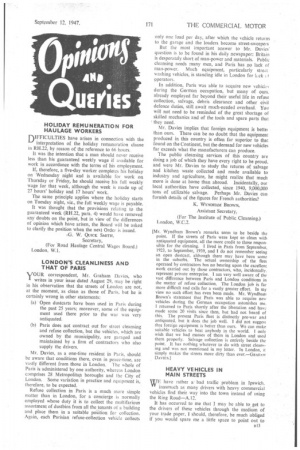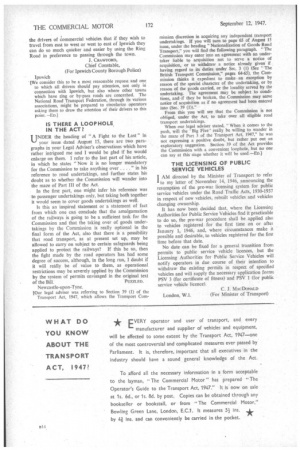HOLIDAY REMUNERATION FOR HAULAGE WORKERS D IFFICULTIES have arisen in connection
Page 47

Page 48

If you've noticed an error in this article please click here to report it so we can fix it.
with the interpretation of the holiday remuneration clause in RH.22, by reason of the reference to 66 hours.
It was the intention that a man should never receive less than his guaranteed weekly wage if available for work in accordance with the terms of his employment.
If, therefore, a five-day worker completes his holiday on Wednesday night and is available for work on Thursday or Friday, he should receive his full weekly wage for that week, although the week is made up of 27 hours' holiday and 17 hours' work.
The same principle applies where the holiday starts on Tuesday night, viz., the full weekly wage is payable.
It was thought that the provisions relating to the guaranteed week (RH.22, para. 4) would have removed any doubts on the point, but in view of the differences of opinion which have arisen, the Board will be asked to clarify the position when the next Order is issued.
.G. W. Quicic Secretary, (For Road Haulage Central Wages Board.) London, W.1.
LONDON'S CLEANLINESS AND THAT OF PARIS \/VOUR correspondent, Mr. Graham Davies, who 'OUR in your issue dated August 29, may be right in his observation that the streets of London are not, at the moment, as clean as those of Paris, but he is certainly wrong in other statements: (a) Open dustcarts have been used in Paris during the past 25 years; moreover, some of the equipment used there prior to the war was very antiquated.
(b) Paris does not contract out for street cleansing and refuse collection, but the vehicles, which are owned by the municipality, are garaged and maintained by a firm of contractors who also supply the drivers.
Mr. Davies, as a one-time resident in Paris, should be aware that conditions there, even in peace-time, are vastly tlifferent from those in London. The whole of Paris is administered by one authority, whereas London comprises 28 Metropolitau boroughs and the City of London. Some variation in practice and equipment is, therefore, to be expected.
Refuse collection in Paris is a much more simple matter than in London, for a concierge is normally employed whose duty it is to collect the multifarious assortment of dustbins from all the tenants of a building and place them in a suitable position for collection. Again, each Parisian refuse-collection vehicle collects
only one load per day, after which the vehicle returns to the garage and the loaders become street-sweepers
But the most important answer to .Mr. Davies' question is to be found in his daily newspaper: Britain is desperately short of man-power and materials. Public cleansing needs many men, and Paris has no lack of man-power. Much equipment, particularly strezt washing vehicles, is standing idle in London for li.ck pperators.
In addition, Paris was able to acquire new vehide, during the German occupation, but many of ours. already employed far beyond their useful life in refuse collection, salvage, debris clearance and other civil defence duties, still await much-needed overhaul. You will not need to be reminded of the great shortage of skilled mechanics and of the tools and spare parts that they need.
Mr. Davies implies that foreign equipment is bettei than ours. There can be no doubt that the equipment produced in this country is often far superior to that found on the Continent, but the demand for new vehicles far exceeds what the manufacturers can produce.
The public cleansing services of this country are doing a job of which they have every right to be proud, and were Mr. Davies to study the returns of salvage and kitchen waste collected and made available to industry and agriculture, he might realize that much more is done at home than abroad. Incidentally, our local authorities have collected, since 1940, 9,000,000 tons of utilizable salvage. Perhaps Mr. Davies can furnish details of the figures for French authorities?
K. WYNDHAM BROWN,
Assistant Secretary,
(For The Institute of Public Cleansing.) London, W.C.2.
[Mr. Wyndham Brown's remarks seem to be beside the point. If the streets of Paris were kept so clean with antiquated equipment, all the more credit to those responsible for the cleaning. I lived in Paris from September, 1923, to September, 1939, and I do not remember seeing an open dustcart, although there may have been some in the suburbs. The actual ownership of the fleet operated by contractors has no bearing upon the excellent work carried out by those contractors, who, incidentally. represent private enterprise. I am very well aware of the vast difference between Paris and London conditions in the matter of refuse collection. The London job is far more difficult and calls for a vastly greater effort. In my view no such effort has even been made. Mr. Wyndham Brown's statement that Paris was able to acquire new vehicles during the German occupation astonishes me. I returned to Paris shortly after the liberation and hay:: made some 20 visits since then, but had not heard of this. The present Paris fleet is distinctly pre-war and antiquated, but it does the job well. I did not suggest that foreign equipment is better than ours. We can make suitable vehicles to beat anybody in the world. I only wish that we had masses of them in London and used them properly. Salvage collection is entirely beside the point. It has nothing whatever to do with street cleansing and was not mentioned in my letter. In London, it simply makes the streets more dirty than ever.—GRAiRsi DAvirs.1 HEAVY VEHICLES IN MAIN STREETS WE have rather abad traffic problem in Ipswich. vv inasmuch as many drivers with heavy commercial vehicles find their way into the town instead of using the Ring Road—A.12.
It has occurred to me that I may be able to get to the drivers of these vehicles through the medium of your trade paper, I should, therefore, be much obliged if you would spare me a little space to point out to the drivers of commercial vehicles that if they wish to travel from east to west or west to east of Ipswich they can do so much quicker and easier by using the Ring Road in preference to passing through the town.
J. CRAWFORD, Chief Constable, (For Ipswich County Borough Police) Ipswich ' [We consider this to be a most reasonable request and one to which all drivers should pay attention, not only in connection with Ipswich, but also where other towns which have ring or by-pass roads are conceriled. The National Road Transport Federation, through its various associations, might be prepared to circularize operators asking them to draw the attention of their drivers to this pain t.—EDJ
IS THERE A LOOP HOLE. IN THE ACT ?
uNDER the heading of "A Fight to the Last" in your issue dated August 15, there are two paragraphs in your Legal Adviser's observations which have rather intrigued me and I would be glad if he would enlarge on them. I refer to the last part of his article, in which he states "Now it is no longer mandatory for the Commission to take anything over . . . ." in his reference to road undertakings, and further states his doubt as to whether the Commission will wander into the maze of Part III of the Act.
In the first part, one might infer his reference was to passenger undertakings only, but taking both together it would seem to cover goods undertakings as well.
Is this an inspired statement or a statement of fact from which one can conclude that the amalgamation of the railways is going to be a sufficient task for the Commission and that the taking over of goods undertakings by the Commission is really optional in the final form of the Act, also that there is a possibility that road transport, as at present set up, may be allowed to carry on subject to certain safeguards being applied to protect the railways? If this be so, then the fight made by the road operators has had some degree of success, although, in the long run, I doubt if it will really be of value to them, as operational restrictions may be severely applied by the Commission by the system of permits envisaged in the original text of the Bill. PUZZLED. Newcastleupon-Tyne.
[Our legal adviser was referring to Section 39 (1) of the Transport Act, 1947, which allows the Transport Corn
mission discretion in acquiring any independent transport undertakings. If you will turn to page 65 of August 15 issue, under the heading " Nationalization of Goods Road Transport," you will find the following paragraph. "The Commission may enter into an agreement with an undertaker liable to acquisition not to serve a notice of acquisition, or to withdraw a notice already given if having regard to its duties under Sec. 3 (1) (See —the British Transport Commission," pages 64-65), the Commission thinks it expedient to make an exception by reason of the special character of the undertaking, or by reason of the goods carried, or the locality served by the undertaking. The agreement may be subject to conditions, and if they be broken, the Commission may serve notice of acquisition as if no agreement had been entered into (Sec. 39 (1))."
From this you will see that the Commission is not obliged, under the Act, to take over all eligible road transport undertakings.
When our legal adviser stated, When it comes to the push, will the 'Big Five' really be willing to wander in the maze of Part 3 of the Transport Act. 1947," he was not expressing a positive doubt, but rather put out an exploratory suggestion. Section 39 of the Act provides the Commission with a convenient loophole, but no one can say at this stage whether it will be used.—ED.] THE LICENSING OF PUBLIC SERVICE VEHICLES I AM directed by the Minister of Transport to refer I to my letter of November 14, 1946, announcing the resumption of the pre-war licensing system for public service vehicles under the Road Traffic Acts, 1930-1937 in respect of new vehicles, rebuilt vehieles and vehicles changing ownership.
It has now been decided that, where the Licensing Authorities for Public Service Vehicles find it practicable to do so, the pre-war procedure shall be applied also to vehicles registered for the first time on or after January 1, 1946, and, where circumstances make it possible and desirable, to vehicles registered for the first time before that date.
No date can be fixed for a general transition from permits to public service vehicle licences, but the Licensing Authorities for Public Service Vehicles will notify operators in due course of their intention to withdraw the existing permits in respect of specified vehicles and will supply the necessary application forms PSV 3 (for certificate of fitness) and PSV 1 (for public service vehicle licence).
C. J. MACDONALD London, W.1. (For Minister of Transport)




















































































